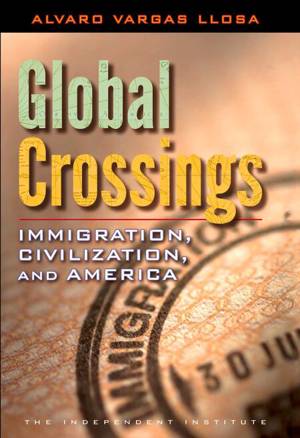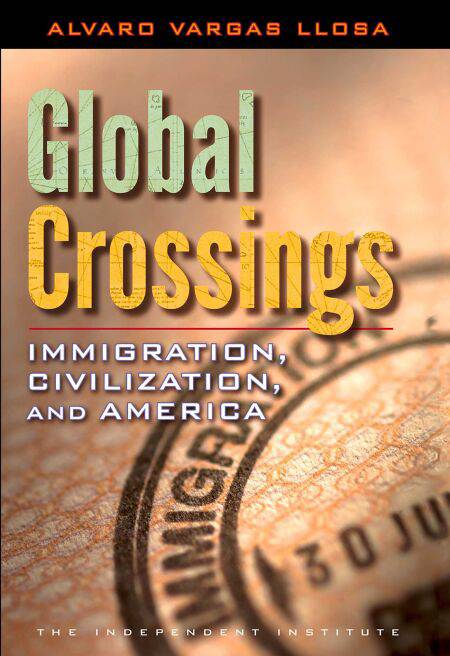
- Retrait gratuit dans votre magasin Club
- 7.000.000 titres dans notre catalogue
- Payer en toute sécurité
- Toujours un magasin près de chez vous
- Retrait gratuit dans votre magasin Club
- 7.000.0000 titres dans notre catalogue
- Payer en toute sécurité
- Toujours un magasin près de chez vous
11,17 €
+ 11 points
Format
Description
Immigration still elicits fear and mistrust, and not just on the part of the “receiving” society despite having occurred for thousands of years throughout human history. Communities from which people migrate often disapprove of the migrants’ decision and consider it treacherous. The recent reawakening of the debate about immigration in the new millennium has evoked intense emotion particularly in the United States and Europe.
Global Crossings cuts through the jungle of myth, falsehood and misrepresentation that dominates the debate, clarifying the causes and consequences of human migration. Why do millions of people continue to risk their lives, and oftentimes lose them, in the pursuit of a chance to establish themselves in a foreign land?
The book first looks at the immigrant experience, which connects the present to the past, and America to the rest of the world, and explores who migrants are and why they move. The conduct of migrants today is no different than that of migrants in the past. And contrary to the claims by immigration critics, the patterns of contemporary migration do not differ fundamentally from those of other epochs.
Global Crossings then discusses immigration regarding culture. To what degree are foreigners culturally different? Can natives adapt? Can immigrants assimilate into the new society? In assessing whether critics are justified in pointing to a major cultural shift Alvaro Vargas Llosa reviews such topics as religion, education, entrepreneurial spirit, and attitudes toward the receiving society.
The book then analyzes such economic factors as jobs, wages, education, and the welfare state. How can an economy continue to operate even in the face of major legal obstacles, and how have recessions and times of prosperity influenced—more significantly than government efforts—the number of immigrants coming into the United States and other countries? Vargas Llosa finds that immigration’s contributions to an economy far outweigh the costs.
Finally Global Crossings makes a call for open minds and provides a pro-immigration agenda for reform. The erosion of national boundaries—and even the idea of the nation state—is already underway as people become ever more inter-connected across borders. This process will make immigration a defining force in the arena of competitive globalization and the people of those countries who embrace immigration will enjoy more prosperous, peaceful, and freer lives in the emerging world.
Global Crossings cuts through the jungle of myth, falsehood and misrepresentation that dominates the debate, clarifying the causes and consequences of human migration. Why do millions of people continue to risk their lives, and oftentimes lose them, in the pursuit of a chance to establish themselves in a foreign land?
The book first looks at the immigrant experience, which connects the present to the past, and America to the rest of the world, and explores who migrants are and why they move. The conduct of migrants today is no different than that of migrants in the past. And contrary to the claims by immigration critics, the patterns of contemporary migration do not differ fundamentally from those of other epochs.
Global Crossings then discusses immigration regarding culture. To what degree are foreigners culturally different? Can natives adapt? Can immigrants assimilate into the new society? In assessing whether critics are justified in pointing to a major cultural shift Alvaro Vargas Llosa reviews such topics as religion, education, entrepreneurial spirit, and attitudes toward the receiving society.
The book then analyzes such economic factors as jobs, wages, education, and the welfare state. How can an economy continue to operate even in the face of major legal obstacles, and how have recessions and times of prosperity influenced—more significantly than government efforts—the number of immigrants coming into the United States and other countries? Vargas Llosa finds that immigration’s contributions to an economy far outweigh the costs.
Finally Global Crossings makes a call for open minds and provides a pro-immigration agenda for reform. The erosion of national boundaries—and even the idea of the nation state—is already underway as people become ever more inter-connected across borders. This process will make immigration a defining force in the arena of competitive globalization and the people of those countries who embrace immigration will enjoy more prosperous, peaceful, and freer lives in the emerging world.
Spécifications
Parties prenantes
- Auteur(s) :
- Editeur:
Contenu
- Nombre de pages :
- 384
- Langue:
- Anglais
Caractéristiques
- EAN:
- 9781598131352
- Date de parution :
- 31-05-13
- Format:
- Ebook
- Protection digitale:
- Adobe DRM
- Format numérique:
- ePub

Les avis
Nous publions uniquement les avis qui respectent les conditions requises. Consultez nos conditions pour les avis.






